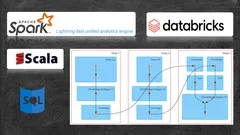
Optimizing Apache Spark on Databricks 
This course provides an in-depth exploration of how to optimize Apache Spark clusters on Azure Databricks. Learn how to identify and address data ingestion issues and performance bottlenecks to maximize the performance of your Spark clusters. ▼
ADVERTISEMENT
Course Feature
![]() Cost:
Cost:
Free Trial
![]() Provider:
Provider:
Pluralsight
![]() Certificate:
Certificate:
Paid Certification
![]() Language:
Language:
English
![]() Start Date:
Start Date:
On-Demand
Course Overview
❗The content presented here is sourced directly from Pluralsight platform. For comprehensive course details, including enrollment information, simply click on the 'Go to class' link on our website.
Updated in [February 21st, 2023]
What does this course tell?
(Please note that the following overview content is from the original platform)
This course will teach you how to optimize the performance of Spark clusters on Azure Databricks by identifying and mitigating various issues such as data ingestion problems and performance bottlenecks
The Apache Spark unified analytics engine is an extremely fast and performant framework for big data processing. However, you might find that your Apache Spark code running on Azure Databricks still suffers from a number of issues. These could be due to the difficulty in ingesting data in a reliable manner from a variety of sources or due to performance issues that you encounter because of disk I/O, network performance, or computation bottlenecks. In this course, Optimizing Apache Spark on Databricks, you will first explore and understand the issues that you might encounter ingesting data into a centralized repository for data processing and insight extraction. Then, you will learn how Delta Lake on Azure Databricks allows you to store data for processing, insights, as well as machine learning on Delta tables and you will see how you can mitigate your data ingestion problems using Auto Loader on Databricks to ingest streaming data. Next, you will explore common performance bottlenecks that you are likely to encounter while processing data in Apache Spark, issues dealing with serialization, skew, spill, and shuffle. You will learn techniques to mitigate these issues and see how you can improve the performance of your processing code using disk partitioning, z-order clustering, and bucketing. Finally, you will learn how you can share resources on the cluster using scheduler pools and fair scheduling and how you can reduce disk read and write operations using caching on Delta tables. When you are finished with this course, you will have the skills and knowledge of optimizing performance in Spark needed to get the best out of your Spark cluster.
We consider the value of this course from multiple aspects, and finally summarize it for you from three aspects: personal skills, career development, and further study:
(Kindly be aware that our content is optimized by AI tools while also undergoing moderation carefully from our editorial staff.)
What skills and knowledge will you acquire during this course?
This course will provide learners with the skills and knowledge to optimize the performance of Spark clusters on Azure Databricks. Learners will gain an understanding of how to identify and mitigate various issues such as data ingestion problems and performance bottlenecks. They will learn how to use Delta Lake on Azure Databricks to store data for processing, insights, and machine learning on Delta tables. Additionally, learners will gain techniques to mitigate common performance bottlenecks such as serialization, skew, spill, and shuffle. They will also learn how to share resources on the cluster using scheduler pools and fair scheduling, as well as how to reduce disk read and write operations using caching on Delta tables. Finally, learners will gain the skills and knowledge of optimizing performance in Spark needed to get the best out of their Spark cluster.
How does this course contribute to professional growth?
This course provides learners with the skills and knowledge needed to optimize the performance of Spark clusters on Azure Databricks. Learners can identify and mitigate various issues such as data ingestion problems and performance bottlenecks, use Delta Lake on Azure Databricks to store data for processing, insights, and machine learning on Delta tables, and mitigate common performance bottlenecks such as serialization, skew, spill, and shuffle. Additionally, learners can learn how to share resources on the cluster using scheduler pools and fair scheduling, as well as how to reduce disk read and write operations using caching on Delta tables. By completing this course, learners will gain the skills and knowledge of optimizing performance in Spark needed to get the best out of their Spark cluster, thus contributing to their professional growth.
Is this course suitable for preparing further education?
This course is suitable for preparing further education as it provides learners with the skills and knowledge needed to optimize the performance of Spark clusters on Azure Databricks. Learners can learn how to identify and mitigate various issues such as data ingestion problems and performance bottlenecks, use Delta Lake on Azure Databricks to store data, mitigate common performance bottlenecks, share resources on the cluster, and reduce disk read and write operations. These skills and knowledge are essential for further education in the field of Apache Spark.
Course Provider

Provider Pluralsight's Stats at AZClass
Pluralsight ranked 16th on the Best Medium Workplaces List.
Pluralsight ranked 20th on the Forbes Cloud 100 list of the top 100 private cloud companies in the world.
Pluralsight Ranked on the Best Workplaces for Women List for the second consecutive year.
AZ Class hope that this free trial Pluralsight course can help your Databricks skills no matter in career or in further education. Even if you are only slightly interested, you can take Optimizing Apache Spark on Databricks course with confidence!
Discussion and Reviews
0.0 (Based on 0 reviews)
Explore Similar Online Courses

Master Digital Marketing

Tour the Tableau Environment

Python for Informatics: Exploring Information

Social Network Analysis

Introduction to Systematic Review and Meta-Analysis

The Analytics Edge

DCO042 - Python For Informatics

Causal Diagrams: Draw Your Assumptions Before Your Conclusions

Whole genome sequencing of bacterial genomes - tools and applications

Databricks Fundamentals & Apache Spark Core

Databricks Essentials for Spark Developers (Azure and AWS)

Microsoft Azure Databricks for Data Engineering
 Related Categories
Related Categories
 Popular Providers
Popular Providers
Quiz
 Submitted Sucessfully
Submitted Sucessfully
1. What is the main purpose of this course?
2. What is the main benefit of using Delta Lake on Azure Databricks?
3. What are some of the common performance bottlenecks that you are likely to encounter while processing data in Apache Spark?
4. What technique can you use to improve the performance of your processing code?
5. What is the name of the unified analytics engine used in this course?
Correct Answer: Apache Spark


Start your review of Optimizing Apache Spark on Databricks